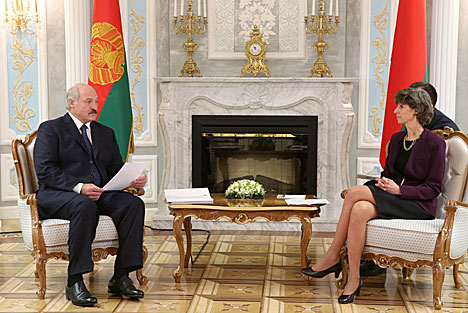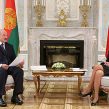
A Change in International Relations and a Thaw With the West
Publication: Eurasia Daily Monitor Volume: 11 Issue: 170
By:

Belarusian analysts continue to assess the change in the international order, driven by the crisis in Ukraine, while Belarus’s relations with the West continue to gradually improve. To some extent, these phenomena are inter-related, and Russia’s worsening image in the eyes of the West may further crystallize this connection.
Yury Tsarik of the Belarusian Development Group, a think tank close to the Belarusian government, has recently opined that, aside from Ukraine, the main loser from the Ukrainian crisis is Russia. Whereas, the United States has solidified its position in Europe’s East and strengthened its influence over the European Union. According to Tsarik, there are seven aspects to Russia’s self-inflicted wound. These are the economic slowdown in Russia and the danger of a full-fledged domestic economic crisis; the loss of access to new technologies and to international credit resources; more than a hundred thousand refugees from Ukraine who have to be taken care of; a drastic worsening of Russia’s international image and a danger of further isolation; the weakening of Russia’s position vis-à-vis pressures from China; a loss of trust by members of the emerging Eurasian Union and a total elimination of the prospect for the Eurasian integration of Ukraine; as well as Russia’s inability to use Western sanctions as an engine for internal economic growth through import substitution with domestically manufactured goods (csfps.by, September 19).
Tsarik believes that prior to the ouster of President Yanukovych of Ukraine in February 2014, Russia somehow coordinated its Ukrainian policy with the US. However, following his ouster, Moscow sensed a betrayal, which explains Russia’s annexation of Crimea and “actions with regard to southeastern Ukraine.” According to Tsarik, one of the outcomes of the resulting new world order for small states is a vastly enhanced perception of the necessity to pursue constructive relationships with the US as the sole remaining hegemon. This is no simple task, not in the least because Washington has a habit of arbitrarily withdrawing from its commitments, but also because it regularly treats smaller countries as bargaining chips and lacks a consolidated political elite, Tsarik claims (csfps.by, September 19).
Even deeper pessimism and dismay over Russia is expressed by Svetlana Alexiyevich, a Russian-language author. Her international name recognition exceeds that of any other writer from Belarus because several of her books have been translated into English and she has won several prestigious literary awards. During a September 16 meeting with her readers in Minsk, Alexiyevich expressed the view that “Russia is more dangerous today than the Soviet Union… There is no Marxist ideology anymore that used to keep the Soviet government in a kind of a stall [corral]. Today, there is no stall, only the laws of punks [hooligans], money and ignorance.” Alexiyevich drew on her concept of the “Red Man,” the refrain of her latest book “Time of the Second Hand” (see EDM, September 25, 2013). The Red Man is an aggressively immobile (a term proposed by Sam Greene) ward of the state, who appreciates brute force as the government’s way to incite respect abroad, and is prone to appreciate pinning the blame for domestic problems on external enemies. The Red Man has not yet abandoned the scene, and his retreat from it is going to be long. Furthermore, Alexiyevich believes that the bloodletting in Ukraine is far from finished, and that a civil war in Russia itself is possible. Outside Moscow and St. Petersburg, one encounters millions of miserable and exasperated people. In contrast to the romantic feelings she entertained during Perestroika, Alexiyevich says she is now living with a sense of defeat (Tut.by, September 17).
In contrast to Tsarik and Alexiyevich, who emphasize the downfall of Russia, Minsk-based analyst Yury Shevtsov reflects on the impending catastrophe in Ukraine. Shevtsov views the war in Ukraine as a drastic consequence of its deindustrialization. For one thing, Ukraine’s current population is smaller than it was in 1989, by 6–7 million people. Cutting off ties with Russia will ultimately destroy the Ukrainian industry, as Russia was its sole market, and will precipitate joblessness, social discontent and an outmigration of many more millions of people both to Russia (from the east of Ukraine) and to the EU (from central and western Ukraine) (guralyuk.livejournal.com, September 15).
Such a growing diversity of viewpoints in the Belarusian analytical community is the new backdrop of Belarus’s ongoing thaw with the West. According to the Belarusian Center of European Transformation, an opposition-minded think tank, two scenarios for Belarus’s future relationship with the West are possible: the continuation of the old cyclical pattern of “thaw-elections-repressions-sanctions,” or the “Azerbaijanization” of relations, whereby the issues of human rights, democratization and civil society are pushed to the periphery of bilateral talks—as has long happened in the West’s dealings with Azerbaijan. Currently, the latter option looks more probable (Tut.by, September 17).
On September 15–17, Laura Tuck, the World Bank’s (WB) vice president for Europe and Central Asia, visited Minsk and met with President Alyaksandr Lukashenka. The latter even declared that “nobody helps us more than the WB” (president.gov.by, September 16). The existing five WB projects in Belarus are worth just $648 million, but the overall sum of Belarus’s borrowings from the WB since 1992 amounts to $1.14 billion. The expansion of the World Bank’s credit lines for Belarus was discussed during Tuck’s visit, including new loans for the development of small businesses, road construction, and for social assistance during the time of painful structural reforms (Tut.by, September 17). Reportedly, those have not been abandoned by Belarus, though the country intends to avoid any social cataclysms associated with them. For example, the government plans to switch to 100 percent out-of-the-pocket utility payments by 2017 (Belorusskie Novosti, September 21).
The pending Belarusian-American Investment Forum (on September 22, in New York City) and the new spirit of Belarusian-Western reconciliation may perhaps explain the publication on the official news agency Belta’s website of a friendly press release about the activities of Scott Roland, the United States’ charge d’affaires in Minsk. Such coverage devoid of negativity has not appeared in Belta in many years (Belta, September 16).
Indeed, the crisis in Ukraine and the resulting effects it has had on the international order may lead to some positive developments for Belarus. The law of unintended consequences has a large scope for application.




